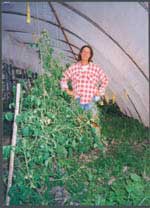![]()
ALUMNI MAGAZINE
AUGUST 1999
| FEATURES | ||
| LETTERS | ||
| AROUND TAPPAN SQUARE | ||
| A STUDENT PERSPECTIVE | ||
| HISTORIAN'S NOTEBOOK | ||
| ALUMNI NEWS | ||
| THE BEAR NECESSITIES | ||
| ONE MORE THING | ||
| STAFF BOX |
("The
30,000-Mile Meal," continued)
The revolution began. "We called
it Guerrilla Theater. Our motto was 'Gastrointestinal liberation
for all!'" says Masi. Members stood on boxes and crates in the middle
of co-op dining rooms and preached the benefits of buying locally.
They wrote a cookbook with recipes that used locally available ingredients
and began bringing in new goods, like squash.
Mileage-count
meals were held at Old Barrows Co-op, where the local-foods group
estimated the miles that the ingredients in their meals had collectively
traveled from their original farms to Oberlin, and compared the
number of calories that went into producing the food with the number
obtained by eating it.
 |
|
Local organic
farmer Adele Straub utilizes her hoop greenhouse to extend
the growing season.
|
Then, and today,
farmers come to Oberlin and eat with students. Monies spent on
local foods have increased from $12,000 to $25,000 (from a budget
of $250,000), yet the process has stayed much the same. Today,
says Kittredge, the ratio of local foods to wholesale has leveled
off. "It's a scale that seems to be working for for us,"
she says."More farmers would be too many."
As for those eggs, we made the last two stops without catastrophe.
But the wind picked up when we started home, and the cardboard
boxes that were once folded and piled next to the eggs began hurtling
from the back of the truck. I thought back to the food-pickers'
meeting the Tuesday before.
"What happened
to the eggs last week?"
"They, um, broke. There were a lot of bumps in the road."
"Don't stack them so high next time."
This time, we hadn't stacked the eggs very high, and when we arrived
on campus, each was intact. The following Thursday, as a two-hour
dinner cook for Pyle Inn Co-op, I used a number of those eggs
in a delicious roasted-vegetable quiche. The eggs' journey from
chicken coop to co-oper stomach had taken only six days and crossed
16 miles. It ended as all co-op meals end, with applause.
ADAM KOWIT is a junior.